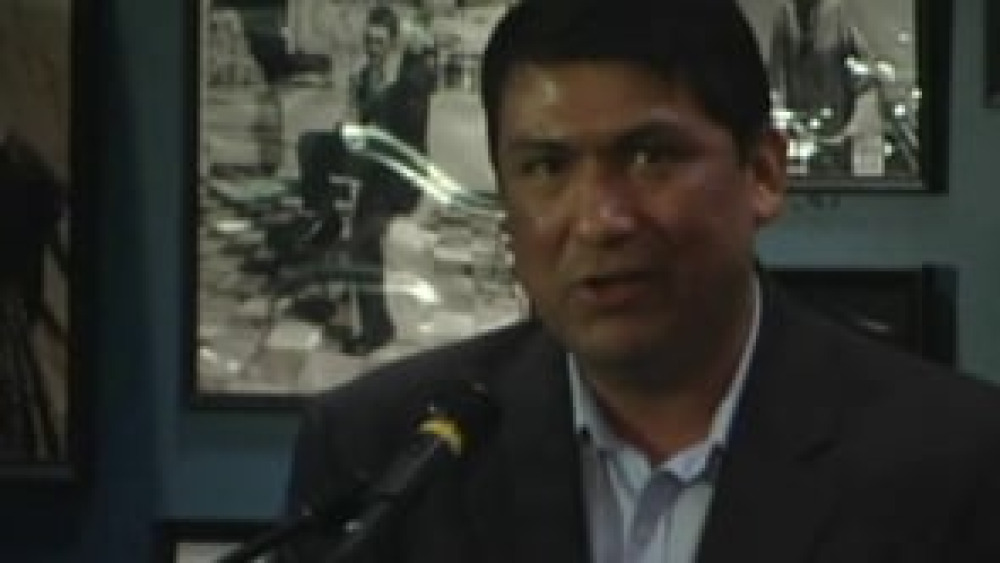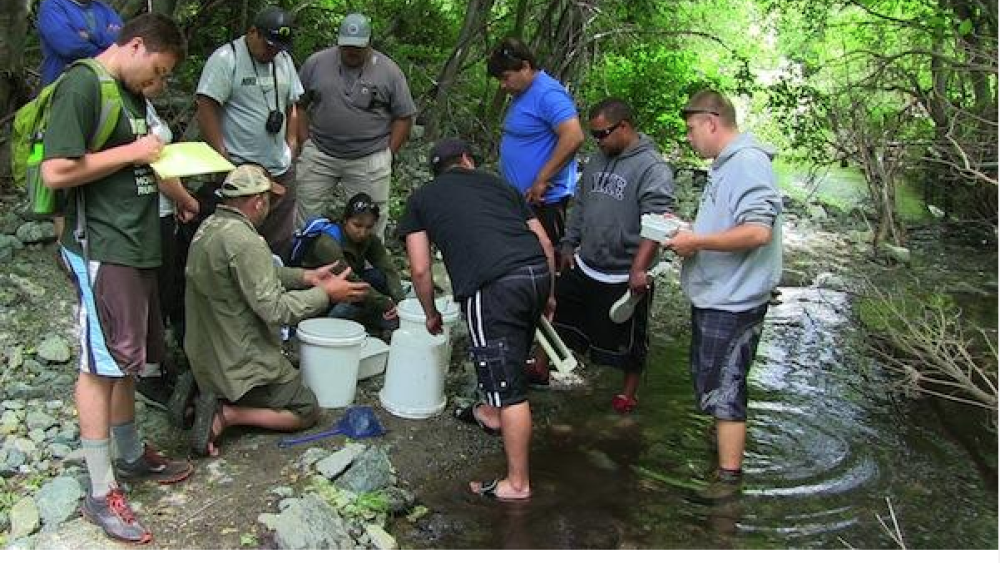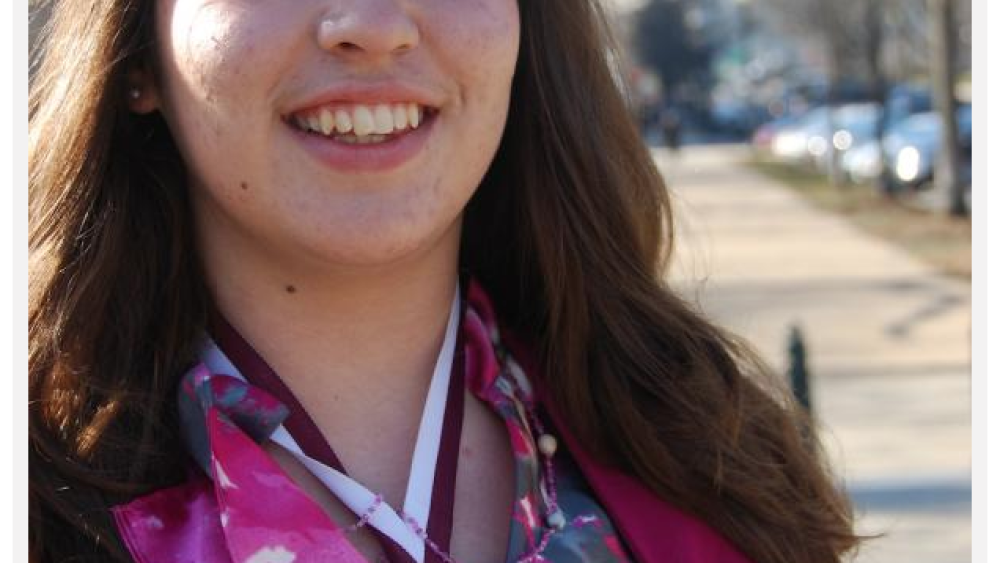Devin Redbird discusses the importance of the Gila River youth council as a source of education and development for the next generation of tribal leaders, while stressing the impact youth councils could have across Native nations.
Additional Information
Redbird, Devin. "The Gila River Youth Council," Honoring Nations symposium. Harvard Project on American Indian Economic Development, John F. Kennedy School of Government, Harvard University. Cambridge, Massachusetts. September 27-28, 2007. Presentation.
Transcript
Heather Kendall-Miller:
"Our next speaker is -- this is going to be fun to listen to -- Mr. Devin Redbird, who is currently a councilman of the Gila River, and he was previously a council rep with the Gila River Youth Council, which was one of our honorees in 2002. So he comes to us now as a council member, no longer a council rep for the Youth Council. So let's welcome Devin."
Devin Redbird:
"Good afternoon. I got short notice, just about maybe half an hour ago, that I was going to speak, so this is going to be interesting. I just want to say good afternoon and I'd like to thank you for letting me speak here today. I just want to touch on the Youth Council program. How many of you in your communities have an active youth council or a youth organization in your community? And if so, can you raise your hand? I just want to see how many of us are out there in the nation. Okay. That's good. And those of you who don't, I encourage you to start a youth council program. It's really -- it makes a really good cause for the youth. It gives them something to strive for and to understand your tribal government; because as many of you have heard, the youth are the future, and you need to encourage them anyway you can and that is a positive way. I myself, yes, I did serve on the Youth Council. We are Gila River Indian Community located in Phoenix, Arizona, just south. We border Phoenix major metropolitan areas. With the Youth Council I served, I come from -- I'm Maricopa. Our tribe is comprised of two tribes, Pima and Maricopa. My district is only Maricopa community within the Gila River.
So, serving on the Youth Council, we received a letter from the [John F.] Kennedy School of Law at Harvard. They were interested in our program, they wanted some more feedback, and that was my last term on the Youth Council, and we gave them everything that we did and not knowing that how, I guess, successful that our program was within our community. We're part of a national -- Youth Council is a part of national -- UNITY [United National Indian Tribal Youth]. And we would go there, and other tribes would come and visit our community, and we'd help them, [because] that's what we're taught, to help other communities. Regardless of who you are, we're going to help you. If you want to start a program, by any means we'll go do a visit. And so we submitted all the material, and I got off of Youth Council at that time [because] my term expired, and to hear a year later that we got honored in 2002, that was a great accomplishment and achievement for the council. But then we talked about change, where a new youth council came on and they need to understand where we are as a community and youth.
The youth program itself, I'll give you a little brief history, is -- our tribal council, back in, I think, 1988 -- our youth of the community didn't have a voice in our community. So the youth basically got together, and banded, and formed a coalition. And it grew so much, because Gila River Indian Community now, our population is 65 percent youth, and it seems to remain like that. So the youth does have a powerful voice. They went to the tribal council. They had their bylaws, resolutions, everything, code of ethics -- something that our own council didn't even have at that time, and remains to still be revised at this time. They came in with their plan of action. They knew what they were doing, they knew their goals, they knew their accomplishments and what to do. The council members tied right down the middle, 50 percent. The governor at that time was Mary V. Thomas and she broke that tie to establish the Youth Council. So the Youth Council was established and we are recognized. Youth Council is recognized as a form of government. Youth Council is a mirror of the council. And over the years it's grown.
When I first came onto the Youth Council, it is an excellent program. We get sworn in by our chief judge in front of a crowd as council does. We take the oath and we are elected in each year at our youth conference by our peers from our district. We go into a caucus and we basically run, usually six to seven people run, for a position to be on the Youth Council. And the former members that are going out have to explain the duty and responsibility [because] you have to give up Saturdays, you have to travel; it's a big responsibility. Plus, Youth Council requires you to hold a GPA still -- within in high school, because these are still high school students and you've got to manage your family at the same time. So this is a real mirror project of the council. Now that I can see that, I'm on the council, it is. It just prepared me for what I'm doing. My transition, personally, was very smooth because of the Youth Council program.
The tribal council also allowed the Youth Council, we have -- we go to D.C. annually and we meet with our [Arizona] senators, McCain and Kyl, and our state representatives, and we have a lobbying firm up there that the tribal council utilizes. So when the Youth Council goes up to D.C. to talk about the youth issues -- the recent one I was on was for Youth Council, which is Arizona, it was tribal gaming. And we went up there to speak the youth voice to the senators saying what positive impact it would have on youth programs and why we would support a proposition. And we would visit and we would lobby, meet the senators, network with other tribal youth from different areas.
Most recently, when I got onto the tribal council -- I wasn't even thinking about running. I was absent from the political scene for like four years. I was into our tribal gaming facility. I ran our slot department; I was slot manager for one of our casinos. Basically, what I did there was, certain shifts were in distress with leadership skills and I had certain qualities, I guess, to bring morale up on a specific shift. So we would engage them and bring up that shift. So I was transferred all over. That got kind of tiresome and so I decided I wanted to go to school, do something. I popped in one of our community meetings and when I left the community meeting I was executive chairperson. It was just -- it was a calling, I guess it was a sign. They knew -- when I was 18 on the Youth Council also, I promoted so many youth programs that the community still remembered the programs that we initiated. So I guess the impact that we had -- I was just doing my job as Youth Council and it just, the impact, I just left a mark on the community, like it needed to be done.
Another proud -- I didn't consider it an accomplishment, but just recently, in one of my meetings, one of our elderly veterans, he's not doing so well, but he says that -- we have a celebration every year, it's called Mustering In Day in my district, which is Native Americans, we were the first ones to get – basically, in Arizona we mustered in when the National Guard, they left to fight the Civil War, they initiated into the Maricopas and Pimas to protect Arizona at that time. So it's a big, it was a proclamation and it's a big celebration for our veterans. So that's what we utilize it for now. We have all the tribes in Arizona, usually we invite their veterans group down and we celebrate that. And in one of the meetings I said, "˜It would be nice to have a flyover. Way out there, who's going to do a flyover?' So we said, "˜Well, let's run with it. Let's go see how far we can go with it and let's do it. So what does it take?' So they said, "˜Why don't you try it?' I said, "˜Well, okay, I'll see...' So what do you do for a flyover? You call the military base, Luke Air Force base. Then they say, "˜Well, call the Pentagon.' Okay, [I] call the Pentagon. It's just a process in which you do things, if you want to get something accomplished. You just do it, right? But who would think to go call -- our staff, they were like -- this lady walked up, she had this real blank face and she was like, "˜The Pentagon's on the phone for you.' To me, I was like, "˜Okay.' And I ran in there. And everybody was just looking at me like, "˜Oh, my god, what's going on?' They just needed material. It's real simple -- you fill out a form, send it in, and if it gets approved or not, that's it. You can get a flyover. So they called me back and said, "˜Yes, you've got your flyover. What time do you want it?' Just follow the steps and just follow your work through, I guess, basically. The day came, nobody knew. Only our committee knew. We told the veterans; everybody came out. And we did the flag raising, we sang our songs, and then, lo and behold, here come these F14 jets roaring by.
I guess just that, it's still -- you need to take initiative. I'm from, I guess like, another generation. Where I see things -- people talk about a lot of things. I used to go to the meetings with my mother and they would talk about building our new, like a new service center for us and I was like nine or ten years old. And I came back when I was 18 and they're still talking about that same thing. That just puzzles me. I don't know. I can understand it [because] even as, growing up I can understand like -- I had opportunity to go get a driver's license but I didn't want to go the DMV or MVD. You just put things off. But if you take one day out of there, you just do what you've got to do, you'll get a lot accomplished. That's just what I stress. That's what my grandfather always taught me. Do something. You can do it, do it right. And if you mess up, learn from it and try again [until] you get it right. So I went to the meeting, like I said, I became executive chairperson.
Youth Council -- it is a pristine program, it's recognized throughout Indian Country. The program works really well. In tribal council even, they still -- my colleagues still refer to me as Youth Council. They say, 'You know, we've got a Youth Council member sitting there.' And one of the other elder, been on the tribal council for a number of years, she pulled me aside and said, the other day she said, "˜Well, you kind of inspired me and made me think back of where I was when I was that young joining, because,' she said, "˜I lost my way of thinking when I first came on and what to accomplish,' she said. So -- and other tribal council -- and it makes me feel good and weird at the same time because it kind of, what were you doing all those years when you were up here?
It's a changing experience. There's two -- I came in with two other council people and we had a chance to go to Washington, D.C. to lobby on some issues and they didn't know what to expect. They didn't know where we were going. They were surprised we were going to a Senate building, we were going to meet McCain, we were going to meet Kyl. It just blew their minds of what we were going to do that day. Those three days, we were just going to go and work D.C. And for me it was just real natural [because], like I said, on Youth Council that's what we did. They also, they're like -- they were asking me what was expected. And I was telling them -- and it doesn't matter, always ask. If you don't know, ask. And they were asking, so I was telling them. It was a good learning experience, because it only builds us as a stronger team later on.
So the mentality of our tribal council is changing a lot. They spoke of per capita. When we were in D.C., our tribe voted for a per capita initiative. And we're 2,000 members strong and they want a strong distribution, and that's quarterly. So we're dealing with that change and we have a year time span for that. So we're ready for that. We are working diligently to that, regardless of the outcome of the vote, we still represent the people. And if they give us a task, we're going to do it regardless of what it is. And if we don't like it, then we don't -- that's not our place right there. What the people tell us to do, we're going to do. And another thing we're doing, we have a lot on our plate. We're doing a tribal re-government restructuring, meaning that we're downsizing our departments because we're top heavy. So that's a major project. And the last project that is also big is that we're revising our constitution. We're revising that program. So we've got three things plus we're dealing with all the local issues, with the mini governments here, just things coming day to day. We've got recall petitions coming in for one or two people, just regular type of politics we're dealing with. With those three initiatives we've got to keep strong and keep straight and that's just another daunting task that we have.
The Youth Council program, if you don't have it, just -- I strongly encourage you because every youth needs a model up there, a lot of directors that come report to us ask questions and they look at me like, "˜Well, why are you asking me?' But ultimately, as council, we are their boss and they're going to answer to us, regardless of our age, or not because we're put in this position. And that's why I think some people are scared because if you're young -- young or old, it doesn't matter your age. It shouldn't matter at all because you're leadership and you need to know what you're talking about. And if you don't know, ask. And that's one thing I wanted to stress a lot because, as Youth Council members -- I went to a youth conference just to go see the conference coordinator. I'm here with him today. I just went to go see [because] I haven't been to conference in four years. Those kids walk in real shy, they don't talk to each other. We do ice breakers, and we do team building, we learn how to let them speak in front of a crowd, [because] we have like 900 to a crowd with our conference. We teach them to lead that conference within a day. We teach that. We bring a trainer and we teach them everything they can. At the end of the conference they're talking, they're running up shaking each other's hands because why -- we're breaking that barrier that they shouldn't have because when you get in the outside world it's all about networking and talking and speaking and asking questions. And we're trying to break that [barrier] when they're 15 and 16 because when you get out there it's going to further, it's only going to enhance your perspectives when you grow up.
And I just -- I strongly encourage that program. If you want any information -- I think we just shared some information with our Navajo Nation friends there and we're going to help them start that if they would wish. Our door's always open. If you have any questions for us, we're always there to help. Or any kind of other youth programs you may have that we can utilize, it's all about sharing and networking. That's basically all I have to say, I think."



